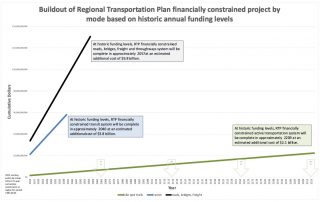
As Oregon legislators start talking about the statewide transportation bill many hope to pass in 2017 (look for some reporting on that soon), others are starting to think locally, too.
We’ve heard from various sources recently that some people in the Portland area are looking toward November 2018 as the right moment for a region-wide bond measure for transportation. The idea is to create a burst of new money for public transit, roadways, biking and walking.
How much of each, you ask? Those negotiations would probably get underway over the next year.
Oregonian reporter Elliot Njus offered some details at the end of an article last month about a public vote in Tigard this fall that will decide whether the city allows or blocks a new light rail line.
The entire Metro region, including Tigard, could be asked in 2018 to vote on a bond measure to pay for a suite of transportation projects, including Southwest Corridor light rail. The measure would likely also include money to fix freeway bottlenecks and for bicycle-pedestrian projects.
Regional leaders have discussed measures modeled after successful efforts in other cities, including a $930 million property tax levy approved by Seattle voters last year.
Bottomly said regional leaders are discussing what such a measure might look like in Portland.
“You have to find that magic point where it’s big enough that people see value but not so big that it’s unaffordable,” he said.
(The hyperlink is our addition.)
Advertisement
This news may not come as a surprise to people reading between the lines of news bits like the time, back in February, when regional government Metro helped pay to bring Denny Zane up for a local talk. He was the political organizer behind Los Angeles County’s big transportation ballot issue.
For people who’d like to raise hundreds of millions of dollars for transportation, regional ballot measures have a lot of promise in Portland. That’s because the metro area is both far more left-leaning than the rest of Oregon and far richer, meaning that a relatively low rate can go a long way.
Because Oregon’s constitution prohibits any fees on auto ownership or use from going to off-road projects, any regional tax that went in part to light rail would probably have to come from property, income, payroll or (gasp) sales taxes. Each would have its own obstacles.
Portland progressives killed a proposed payroll tax hike for bus service earlier this year, saying among other things that an income tax would be fairer. The most recent ballot measure for transit in the Portland area was a property tax bond measure renewal campaign by TriMet, in 2010. The regional transit agency pitched that measure as a way to upgrade its bus fleet for an aging population; it failed 54 percent to 46 percent in the teeth of the recession.
It might also be possible, of course, to craft a measure that would simultaneously tap multiple types of tax for different purposes.
— Michael Andersen, (503) 333-7824 – michael@bikeportland.org
Our work is supported by subscribers. Please become one today.


